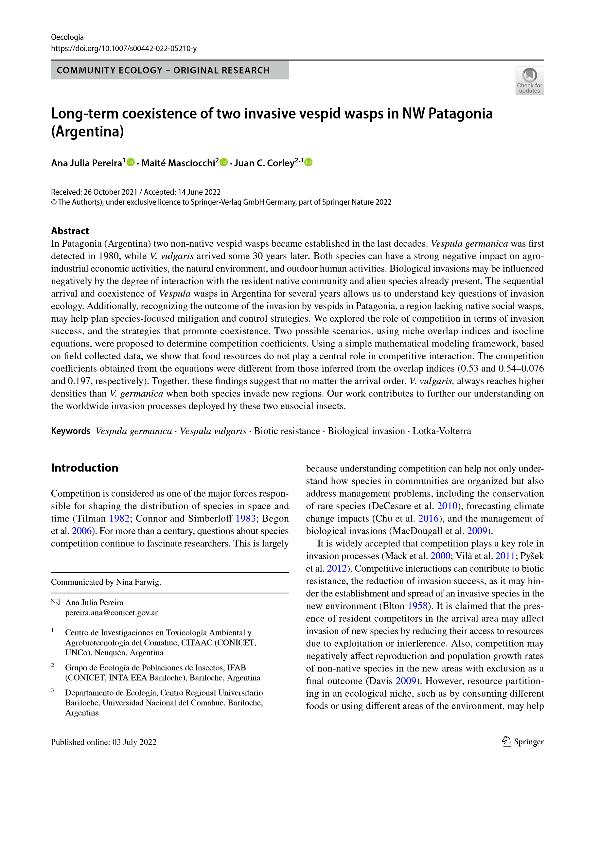Mostrar el registro sencillo del ítem
dc.contributor.author
Pereira, Ana Julia

dc.contributor.author
Masciocchi, Maité

dc.contributor.author
Corley, Juan Carlos

dc.date.available
2023-09-28T11:54:04Z
dc.date.issued
2022-06
dc.identifier.citation
Pereira, Ana Julia; Masciocchi, Maité; Corley, Juan Carlos; Long‑term coexistence of two invasive vespid wasps in NW Patagonia (Argentina); Springer; Oecologia; 199; 3; 6-2022; 661-669
dc.identifier.issn
0029-8549
dc.identifier.uri
http://hdl.handle.net/11336/213393
dc.description.abstract
In Patagonia (Argentina) two non-native vespid wasps became established in the last decades. Vespula germanica was first detected in 1980, while V. vulgaris arrived some 30 years later. Both species can have a strong negative impact on agro-industrial economic activities, the natural environment, and outdoor human activities. Biological invasions may be influenced negatively by the degree of interaction with the resident native community and alien species already present. The sequential arrival and coexistence of Vespula wasps in Argentina for several years allows us to understand key questions of invasion ecology. Additionally, recognizing the outcome of the invasion by vespids in Patagonia, a region lacking native social wasps, may help plan species-focused mitigation and control strategies. We explored the role of competition in terms of invasion success, and the strategies that promote coexistence. Two possible scenarios, using niche overlap indices and isocline equations, were proposed to determine competition coefficients. Using a simple mathematical modeling framework, based on field collected data, we show that food resources do not play a central role in competitive interaction. The competition coefficients obtained from the equations were different from those inferred from the overlap indices (0.53 and 0.54–0.076 and 0.197, respectively). Together, these findings suggest that no matter the arrival order, V. vulgaris, always reaches higher densities than V. germanica when both species invade new regions. Our work contributes to further our understanding on the worldwide invasion processes deployed by these two eusocial insects.
dc.format
application/pdf
dc.language.iso
eng
dc.publisher
Springer

dc.rights
info:eu-repo/semantics/openAccess
dc.rights.uri
https://creativecommons.org/licenses/by-nc-sa/2.5/ar/
dc.subject
BIOLOGICAL INVASION
dc.subject
BIOTIC RESISTANCE
dc.subject
LOTKA-VOLTERRA
dc.subject
VESPULA GERMANICA
dc.subject
VESPULA VULGARIS
dc.subject.classification
Ecología

dc.subject.classification
Ciencias Biológicas

dc.subject.classification
CIENCIAS NATURALES Y EXACTAS

dc.title
Long‑term coexistence of two invasive vespid wasps in NW Patagonia (Argentina)
dc.type
info:eu-repo/semantics/article
dc.type
info:ar-repo/semantics/artículo
dc.type
info:eu-repo/semantics/publishedVersion
dc.date.updated
2023-07-05T12:08:10Z
dc.journal.volume
199
dc.journal.number
3
dc.journal.pagination
661-669
dc.journal.pais
Alemania

dc.journal.ciudad
Berlin
dc.description.fil
Fil: Pereira, Ana Julia. Consejo Nacional de Investigaciones Científicas y Técnicas. Centro Científico Tecnológico Conicet - Patagonia Norte. Centro de Investigaciones en Toxicología Ambiental y Agrobiotecnología del Comahue. Universidad Nacional del Comahue. Facultad de Ciencias Agrarias. Centro de Investigaciones en Toxicología Ambiental y Agrobiotecnología del Comahue; Argentina
dc.description.fil
Fil: Masciocchi, Maité. Instituto Nacional de Tecnología Agropecuaria. Centro Regional Patagonia Norte. Estación Experimental Agropecuaria San Carlos de Bariloche. Instituto de Investigaciones Forestales y Agropecuarias Bariloche. - Consejo Nacional de Investigaciones Científicas y Técnicas. Centro Científico Tecnológico Conicet - Patagonia Norte. Instituto de Investigaciones Forestales y Agropecuarias Bariloche; Argentina
dc.description.fil
Fil: Corley, Juan Carlos. Instituto Nacional de Tecnología Agropecuaria. Centro Regional Patagonia Norte. Estación Experimental Agropecuaria San Carlos de Bariloche. Instituto de Investigaciones Forestales y Agropecuarias Bariloche. - Consejo Nacional de Investigaciones Científicas y Técnicas. Centro Científico Tecnológico Conicet - Patagonia Norte. Instituto de Investigaciones Forestales y Agropecuarias Bariloche; Argentina
dc.journal.title
Oecologia

dc.relation.alternativeid
info:eu-repo/semantics/altIdentifier/doi/http://dx.doi.org/10.1007/s00442-022-05210-y
Archivos asociados
